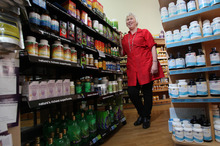Apr 13, 2015

Claims made about the benefits of natural health products such as vitamins will need to be backed by evidence under a new system.
An industry body has hailed the move and says it will help the banning of products such as the “miracle” Ebola cure recently sold by a “health and healing” church.
How best to control natural health products has been a long-running debate, with plans for a joint Australasian regulatory authority scrapped after concerns about cost and a loss of control.
Health officials have told the local industry that a new regime, separate from those for food and medicines, will likely be in place next year.
Only over-the-counter products will be controlled by the Natural Health and Supplementary Products Bill.
Unlike medicines – which are considered higher risk – there will be no assessment of individual products before they are sold.
Instead, once a manufacturer’s factory is approved, products will be processed through internet-based self-certification if the ingredients were on the permitted list of more than 5500 ingredients.
A list of health conditions will be also published. Products can claim health benefits relating to these if supporting evidence is supplied and made available.
For example, the condition “common cold” would be on the list of named conditions, meaning a manufacturer can submit evidence that their product can relieve cold symptoms.
The product label could then claim: “Product ‘Cold Relief’ is helpful in the relief of symptoms associated with the common cold.”
At present only weak, generalised claims are permitted.
All manufacturers of natural health and supplementary products will have to be licensed, including those outside New Zealand.
“It will help consumers an awful lot more if we can actually say that taking vitamin C can help with a cold, for example,” said Alison Quesnel, executive director of Natural Products NZ, an industry group.
“Clearly, colds and flu will be amongst
Ms Quesnel said every industry had its share of “cowboys”, but the vast majority of products manufactured here already met rigorous standards in order to be exported to overseas markets, which were ahead of New Zealand in terms of demanding audited factories.
Health Minister Dr Jonathan Coleman said in a statement the new regime was intended to be “light touch”.
“The bill is intended to regulate low-risk natural health products in a way that is proportionate to the risk they pose … with low fees and compliance costs, be easy to use and minimise the need for relabelling.”
What’s in a word?
Shoppers will not have to read between the lines when buying products like vitamins when new legislation is passed, an industry group says.
Alison Quesnel, executive director of Natural Products NZ, said health benefits of products could be clearly labelled in Australia and other countries.
“You can say on your product – ‘can help with arthritis pain’. And products in Australia can have names like, Joint Pain or Migraine Aid or something like that.
“Whereas here, people are having to be really creative. A phrase that I used – “May help winter ills and chills” – when I was general manager at Blackmores, was the one we used to laugh at because that was all we could say.”
